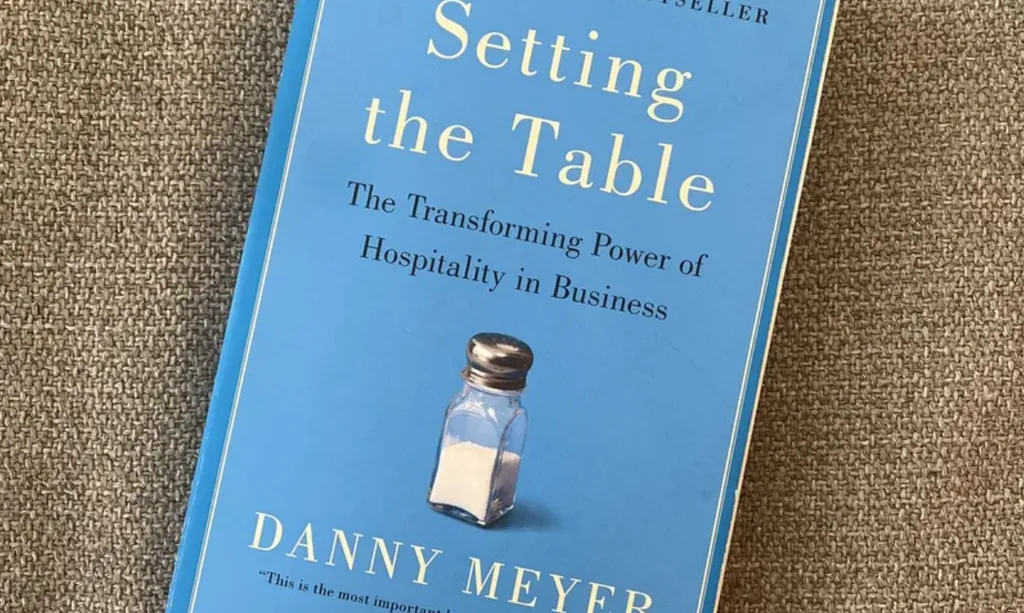
Think about the last time you had an amazing experience as a customer. How did it make you feel?
That's the edge that restaurateur Danny Meyer describes in his book - Setting The Table.
He created wildly successful restaurants in New York City such as Union Square Cafe, Gramercy Tavern, Blue Smoke and many others based on providing amazing experiences for his customers.
He describes the difference between "service" and "hospitality" like this - service is the technical delivery of a product, while hospitality is how the delivery of that product makes its recipient feel.
To have an enduring business built to last, it needs to become essential in the lives of people. It needs to be the kind of business that makes your life better because it exists. - Danny Meyer
When I read this, it struck me that this is a way for any business to create a competitive advantage
My last company - GatherUp - helped businesses listen to their customers and improve aspects of their business. We did our best to show the way in how we operated our business.
We became obsessed with delivering great experiences to our customers. We didn't always get it right, but aspiring to that ideal helped us continually get better. And we built some great relationships with each other and with our customers.
In working with thousands of businesses, we found that the best businesses authentically listened to their customers, solicited feedback, and acted on it. They also treated their employees well because they recognized that in order to deliver great experiences you must have happy employees.
Customer Experience as Your Edge
If you don't have time to read the book, this podcast interview was fantastic: Patrick O'Shaughnessy interview Danny Meyer.
Meyer tells the story of his early days opening restaurants in New York City. Picture this: you're a young restaurateur in Manhattan, one of the most competitive food scenes on the planet. Michelin-starred chefs on every corner. World-class sommeliers. Dining experiences that people fly across oceans to enjoy.
So how do you stand out? A “better” menu or wine list?
Meyer realized that was a losing game. The food had to be excellent, sure, but that was just the entry fee. "There are already many restaurants with great food and wine in the city," he explained. "That's just table stakes."
He needed something else. Something that couldn't be easily copied by the next ambitious chef with a Le Cordon Bleu degree.
He realized his competitive advantage would be hospitality.
Not service. Hospitality. There's a difference. Service is bringing the right dish to the right table at the right temperature. Hospitality is making someone feel seen, valued, and genuinely cared for. It's the entire experience wrapped around that perfectly cooked meal.
This insight transformed Meyer from just another restaurant owner into the founder of Union Square Hospitality Group and Shake Shack. He built an empire not on having the fanciest ingredients or the most innovative recipes, but on making people "feel" special.
The Software Parallel
While listening to the interview, I realized that many software startups are making the mistake Meyer avoided.
Walk into any pitch meeting, scan any Product Hunt launch, read any startup blog. What do you see? Features. Technology. Innovation. "We use AI." "We're blockchain-enabled." "Our algorithm is 10x faster."
It's hard to win a feature war with better funded competitors. In a saturated software market, having a solid product is table stakes.
So what's your hospitality?
For software, hospitality means obsessing over the customer experience in ways that transcend your feature list. It's the onboarding flow that feels like a warm welcome. It's the support response that arrives in minutes, not days, and actually solves the problem instead of linking to documentation. It's the interface that anticipates what someone needs before they realize they need it.
It's Stripe's famous developer experience. It's Notion's community-first growth. It's Superhuman's white-glove onboarding. These companies didn't win because they had the only email client or the only note-taking app or the only payment processor. They won because using their product felt fundamentally different.
Beyond the Fundamentals
In any competitive market, the fundamental offering becomes commoditized. Restaurants can all get great ingredients. Software companies can all build powerful features. Coffee shops can all brew a good cup of coffee.
The winners are the ones who realize that competition happens at a different level entirely. It happens in the dozens of micro-interactions that make up the customer experience. It happens in how you make people feel.
Meyer didn't try to compete on having the most exotic ingredients or the most technically precise cuisine. He competed on making guests feel like they mattered, like they were coming home.
Your software startup can do the same thing. But first, you have to stop thinking like a chef obsessing over the recipe, and start thinking like a host welcoming someone into your home.
The question isn't: "What new features can we build?"
The question becomes: "How can we make people feel when they use what we've built?"
It's hard to do, but I'm trying to remember and apply this with every product or company I'm involved with - as a builder or as an advisor.
p.s. Danny Meyer’s book, Setting the Table is excellent. So is Will Guidara’s Unreasonable Hospitality - which was an inspiration for the popular TV series The Bear.